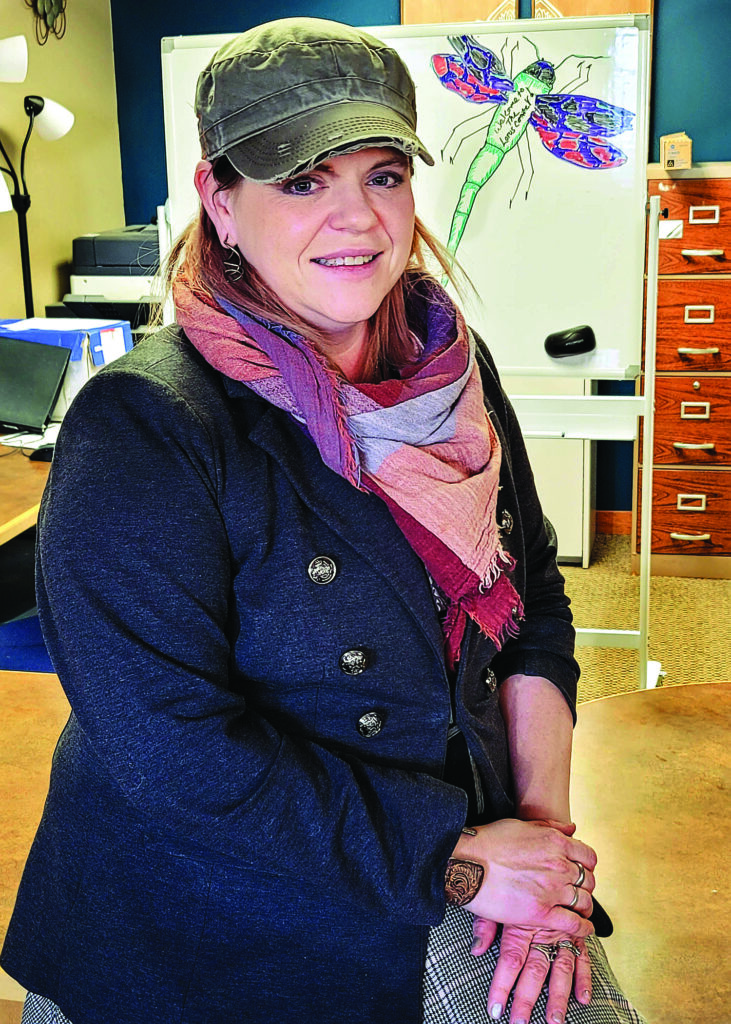moorhead business news

The Lotus Center works with people who have substance use disorders based on the principle of harm reduction. Sarah Chatelain-Gress established the center with partner Elizabeth Nelson in 2019. (Photo/Nancy Hanson.)
The Lotus Center takes a different route to helping substance users recover from their alcohol or drug habits – an approach that asks clients what they want to achieve, rather than dictates a hard-and-fast goal of complete abstinence.
“I don’t care what you’re using or how much you use,” explains executive director Sarah Chatelain-Gress, who opened the center on Eighth Street South with partner Elizabeth Nelson in 2019. “I want to know why you use it. Addiction is a coping mechanism. Once we understand the reasons, we can deal with it.”
Sarah, a licensed addiction counselor and social worker, has built a staff of eight who approach reducing substance use from four perspectives, including mental health, substance use itself, transportation and affordable housing. The outpatient treatment facility provides a variety of settings and services for users and their loved ones, from intensive midday or evening sessions to weekly recovery enhancement groups and LOTS for users’ families and loved ones. LOTS – Loved Ones Training and Support Group – offers preparation for building better relationships and self-care based on the book “Beyond Addiction;” the loved one in participants’ lives does not have to currently be in treatment at the center.
Harm reduction is a new approach in rural Minnesota, Sarah notes. Unlike traditional 12-step programs, it does not require people to achieve and maintain perfect abstinence. “That works for some people,” she says, “but not for everyone. We ask out clients, ‘What are the biggest barriers in your life? What is your goal for treatment?’ It may not be stopping entirely. Maybe it’s cutting back to drinking just on the weekend. Maybe it’s eliminating meth, but not smoking pot. We help them get there.”
She adds, “We’re incredibly client-driven. For us, it’s ‘tell me what you want,’ not ‘this is what you need.’”
The seed that flowered into the Lotus Center grew out of frustration. Five years ago, Sarah and a fellow counselor were venting, she says, about the shortcomings of traditional treatment, with the requirement that someone be abstinent before going into the sheltered setting of residential treatment, then expecting him to never use drugs or alcohol again. After discharge, he’d go back to his natural environment, and after two or three months, start using again. It’s a set-up for failure.”
Most of those who come to the Lotus Center are dealing with alcoholism at some level, the director reports. But drug users’ numbers are significant, too. “Meth is a monster,” she asserts, noting that perhaps 50% of their 100 clients are grappling with it. Opioid use, compounded by fentanyl and carfentanyl, affects a quarter of their clients.
The Lotus Center was created to support long-term recovery. Clients may continue to participate in its programs for two or three years, however long they feel they need the support. The cost is dramatically less than residential programs – $3,000 to $4,000 for months of outpatient services versus tens of thousands for a limited residential stay.
Lotus’s services are covered by most private insurance policies. Uninsured clients are billed on a sliding scale that may mean as little as $25 per month. The center has also been known to reduce the balance by half for clients willing to volunteer in the community. “If you don’t have insurance or other funding, we’ll find it for you,” Sarah promises.
The Lotus staff includes members credentialed in mental health, social work and addiction counseling. Among its specialists are a street outreach worker who meets potential clients in shelters and detox center, an overdose response coordinator and a housing case manager.
Sarah observes that of 46 million Americans today struggling with substance abuse, data show that only 10% will ever get the help they need. “This isn’t strictly an individual problem. It’s a problem for our society,” she says. “Why are people using? When you listen to their life stories, you have to ask … ‘why wouldn’t they?’
“The gateway drug isn’t pot or alcohol or any of the usual culprits,” she concludes. “It’s trauma. These people have seen a lot of it, along with the way our community isolated those with substance abuse problems.
“The answer isn’t abstinence. It’s connection.”
To connect with the Lotus Center, call 218-284-1800. For more information on its programs and services, visit counterintelligence.

